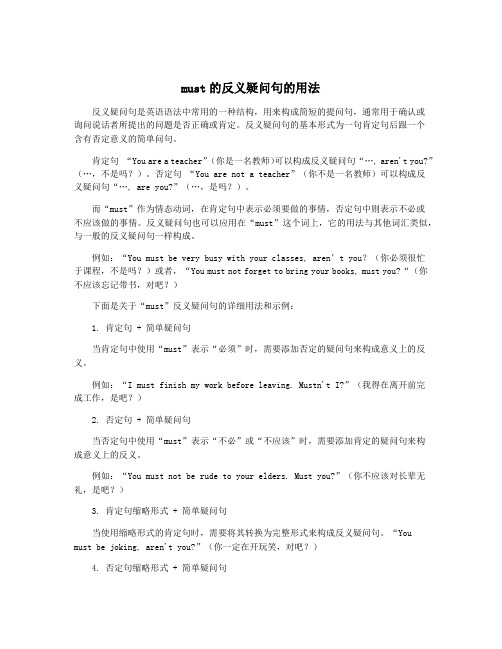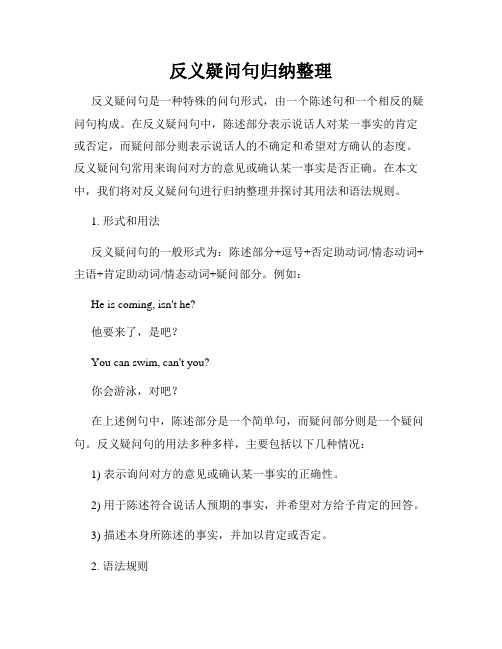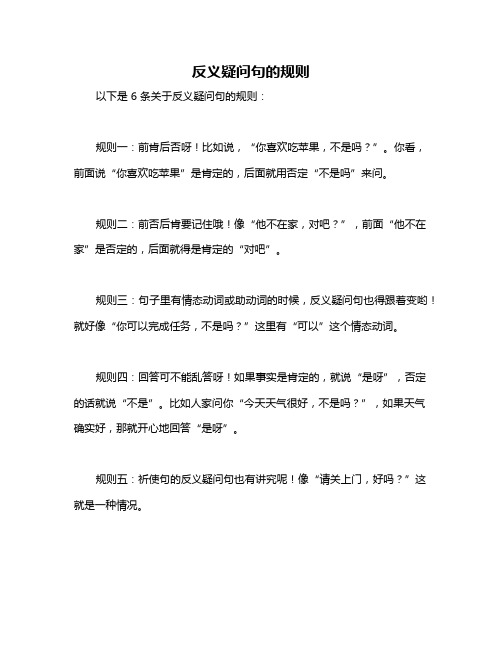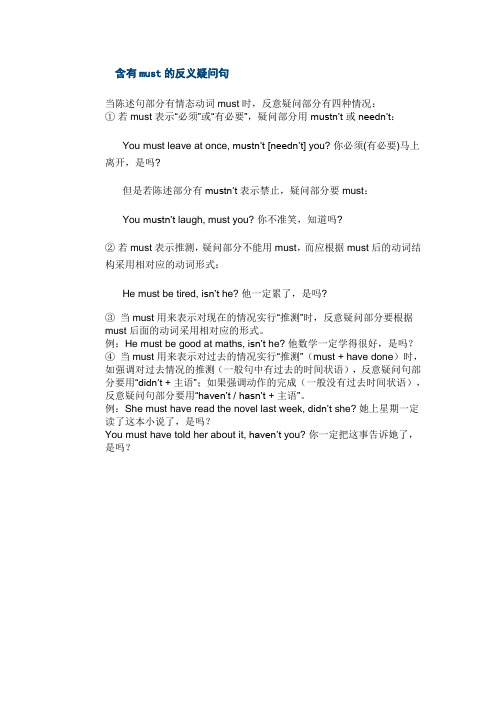情态动词的反义疑问句
几种特殊的反义疑问句1

几种特殊的反义疑问句 1.祈使句。
祈使句后一般加上will you或won't you组成反意疑问句,用will you 多表示“请求”,用won't you 多表示提示对方注意。
1)Let's...,后的反意疑问句用shall we 或shan't we。
还可以用may I来表示征求对方的同意或许可。
2)Let us/me...后的反意疑问句用will you或won't you。
2.感叹句。
感叹句后加反意疑问句时,其反意疑问句需用be的一般此刻时态的否定形式。
3. 当陈述部份谓语动词是need, dare, used to,且这些词被用作实义动词时,其反意疑问句需用do的适当形式。
4.陈述部份主、谓语是I am...时,反意疑问句用aren't I 或ain't I ,而不是am not I (可用am I not)。
5.陈述部份的主语是everything, nothing, anything或something 时,反意疑问句的主语应用代词it。
6.陈述部份的主语是everybody, everyone, anybody, anyone, somebody, someone, nobody, no one, none, neither 时, 其反意疑问句的主语需用复数代词they。
7.陈述部份的主语是指示代词this或that时,反意疑问句的主语用it,当陈述部份的主语是指示代词these或those 时,其反意疑问句的主语用they。
8.陈述部份的主语是不定代词one时,反意疑问句的主语可以用one,也可用you(美式英语用he)。
9.当陈述部份含有以下这些含有否定意义的词时:few, little, seldom,hardly, never, not, no, no one, nobody, nothing, none, neither等,其反意疑问句需用肯定结构。
must的反义疑问句的用法

must的反义疑问句的用法反义疑问句是英语语法中常用的一种结构,用来构成简短的提问句,通常用于确认或询问说话者所提出的问题是否正确或肯定。
反义疑问句的基本形式为一句肯定句后跟一个含有否定意义的简单问句。
肯定句“You are a teacher”(你是一名教师)可以构成反义疑问句“…, aren't you?”(…,不是吗?)。
否定句“You are not a teacher”(你不是一名教师)可以构成反义疑问句“…, are you?”(…,是吗?)。
而“must”作为情态动词,在肯定句中表示必须要做的事情,否定句中则表示不必或不应该做的事情。
反义疑问句也可以应用在“must”这个词上,它的用法与其他词汇类似,与一般的反义疑问句一样构成。
例如:“You must be very busy with your classes, aren’t you?(你必须很忙于课程,不是吗?)或者,“You must not forget to bring your books, must you?“(你不应该忘记带书,对吧?)下面是关于“must”反义疑问句的详细用法和示例:1. 肯定句 + 简单疑问句当肯定句中使用“must”表示“必须”时,需要添加否定的疑问句来构成意义上的反义。
例如:“I must finish my work before leaving. Mustn't I?”(我得在离开前完成工作,是吧?)2. 否定句 + 简单疑问句当否定句中使用“must”表示“不必”或“不应该”时,需要添加肯定的疑问句来构成意义上的反义。
例如:“You must not be rude to your elders. Must you?”(你不应该对长辈无礼,是吧?)3. 肯定句缩略形式 + 简单疑问句当使用缩略形式的肯定句时,需要将其转换为完整形式来构成反义疑问句。
“You must be joking, aren't you?”(你一定在开玩笑,对吧?)4. 否定句缩略形式 + 简单疑问句当使用缩略形式的否定句时,需要将其转换为完整形式来构成反义疑问句。
情态动词反义疑问句总结要点

情态动词要点一:常用情态动词:Can,could,may,might,must,shall,should,will,would,其它:ought to,need,dare二:shall只用于第一人称三:否定的含义Can’t不可能/不能够may not不可以needn’t不需要mustn’t禁止should’t不应该四:1 以must开头的问句肯定回答:yes, you must.否定的回答要用needn’t或don’t have to回答2 以may开头的问句一般表示许可或征询对方许可,表示可以的意思,常与第一人称I连用。
构成May I……?句式。
肯定回答用Yes,you may. Yes,please.否定句用No, you can’t.或No, you mustn;t.3以can开头的问句肯定yes,you can.否定you can’t.4:以need开头的问句。
肯定:yes, you must. 否定:No,you needn’t.五:maybe和may be区别Maybe是副词,常做状语,意为也许可能,相当于perhaps位于句首。
May be是一个情态动词加动词原型的用法,是一个完整的谓语形式,意为可能是……也许是……例如:Maybe he is a teacher.=He may be a teacher.Maybe you are right=You may be right.六:must和have to区别Must是必须干什么,比较主观的要求命令Have to 是由于客观的原因不得不七:could只在问句中表示温婉礼貌请求,是一般现在时,回答要用can.八:need1:做实意动词是需要的意思,有人称和数的变化,通常在肯定句中2:做情态动词后接动词原型,通常在否定句和疑问句中。
反义疑问句要点一:定义:反义疑问句是由陈述句和附在后面的附加疑问句组成。
前否后肯,前肯后否。
二:附加疑问句的主语要用相应代词。
反义疑问句讲解与练习

反义疑问句讲解与练习一、含be(is, are, was, were)动词的反意疑问句(1)句型1:主语+ be+其它,isn’t(aren’t, wasn’t, weren’t)+ 主语?句型2:主语+ be not+其它,is(are, was, were) + 主语?① You are from America, aren’t you? Yes, I am. No, I’m not.② It isn’t very cold today, is it? Yes, it is. No,it isn’t.(2)注意:There be句型例:There is an old picture on the wall, isn’t there?二、带行为动词反意疑问句(不含be和情态动词)句型1:主语+动词+其他,do/did/does + not +主语?句型2:主语+did/does/do+not +动词原形+其他,did/do/does+其他?例:You often watch TV in the evening, don’t you? Yes, I do. No, I don’t.三、含有情态动词的反意疑问句,反义疑问句中的动词使用情态动词。
例:The students must study hard, mustn’t they? Yes, they must. No, they needn’t.注意:You must go home now, needn’t you? Yes, I must. No, I needn’t.★注意:There be句型的一般将来时① There will be a basketball match tomorrow, won’t there?Yes, there will. No, there won’t.② There won’t be too much pollution in the future, will there?Yes, there will. No, there won’t.四、反义疑问句的回答:答语要和实际情况相符合,遵循“实事求是”的原则。
反义疑问句归纳整理

反义疑问句归纳整理反义疑问句是一种特殊的问句形式,由一个陈述句和一个相反的疑问句构成。
在反义疑问句中,陈述部分表示说话人对某一事实的肯定或否定,而疑问部分则表示说话人的不确定和希望对方确认的态度。
反义疑问句常用来询问对方的意见或确认某一事实是否正确。
在本文中,我们将对反义疑问句进行归纳整理并探讨其用法和语法规则。
1. 形式和用法反义疑问句的一般形式为:陈述部分+逗号+否定助动词/情态动词+主语+肯定助动词/情态动词+疑问部分。
例如:He is coming, isn't he?他要来了,是吧?You can swim, can't you?你会游泳,对吧?在上述例句中,陈述部分是一个简单句,而疑问部分则是一个疑问句。
反义疑问句的用法多种多样,主要包括以下几种情况:1) 表示询问对方的意见或确认某一事实的正确性。
2) 用于陈述符合说话人预期的事实,并希望对方给予肯定的回答。
3) 描述本身所陈述的事实,并加以肯定或否定。
2. 语法规则在构成反义疑问句的过程中,需要遵循一些语法规则,以确保句子的正确性和逻辑性。
2.1 句子主语在反义疑问句中,疑问部分的主语通常与陈述部分一致。
例如:She likes ice cream, doesn't she?她喜欢冰淇淋,对吧?You have finished your homework, haven't you?你完成了作业,是吧?2.2 肯定和否定疑问部分的肯定或否定助动词/情态动词取决于陈述部分的肯定或否定。
如果陈述部分是肯定的,疑问部分的助动词/情态动词是否定形式,反之亦然。
例如:He doesn't like chocolate, does he?他不喜欢巧克力,对吧?They can't swim, can they?他们不会游泳,是吧?2.3 时态和语态反义疑问句的时态和语态一般与陈述部分保持一致。
例如:She has been to Paris, hasn't she?她去过巴黎,是吧?The book wasn't written by him, was it?这本书不是他写的,对吧?3. 总结反义疑问句是一种特殊的问句形式,常用来询问对方的意见或确认某一事实的正确性。
反义疑问句与情态动词

情态动词一、情态动词的定义:情态动词表示说话人对某一动作或状态的态度。
※二、情态动词的特点:1)有一定词义;2)不受主语人称和数的变化影响;3)与主要动词的原形(或称不带to的不定式)一起构成谓语(除ought to作固定词组看待)。
三、情态动词的基本用法:※(一)、can的用法:1. (表示能力、功能)能,会The classroom can seat thirty students. 这教室能坐三十位学生。
June can drive now. 琼现在会开车了。
2. (表示允许、请求)可以You can't take the book out of the room. 你不可以将这本书拿出室外。
Can I use your pen? 我可以用一下你的笔吗?3. could的用法can的过去式;用于婉转语气:能,可以。
◆易混点can 和be able to两者表示能力时用法相同,但can 只有原形“can” 和过去式“ could ”两种形式,在其他时态中要用be able to 来表示。
另外be able to 常常指经过努力,花费了时间和劳力之后才能做到某事。
如:Jim can’t speak English. 吉姆不会说英语。
He could speak English at 5. 他五岁时就会说英语。
We’ll be able to see him next week.下星期我们将会见到他。
He has been able to drive. 他已经会开车了。
※(二)、may的用法1. 表示请求和允许,意思是:可以He may come if he likes. 如果他想来,可以来。
◆易混点can和maycan 和may 均可用来征求意见或许可,意为“可以”,一般可互换使用。
如:Can/ May I help you ? 我能帮助你吗?2. 表示祝愿,意思是:祝…,(但愿)。
May you have a good luck! 祝你好运。
反义疑问句的规则

反义疑问句的规则
以下是 6 条关于反义疑问句的规则:
规则一:前肯后否呀!比如说,“你喜欢吃苹果,不是吗?”。
你看,前面说“你喜欢吃苹果”是肯定的,后面就用否定“不是吗”来问。
规则二:前否后肯要记住哦!像“他不在家,对吧?”,前面“他不在家”是否定的,后面就得是肯定的“对吧”。
规则三:句子里有情态动词或助动词的时候,反义疑问句也得跟着变哟!就好像“你可以完成任务,不是吗?”这里有“可以”这个情态动词。
规则四:回答可不能乱答呀!如果事实是肯定的,就说“是呀”,否定的话就说“不是”。
比如人家问你“今天天气很好,不是吗?”,如果天气确实好,那就开心地回答“是呀”。
规则五:祈使句的反义疑问句也有讲究呢!像“请关上门,好吗?”这就是一种情况。
规则六:否定前移的句子要注意后面的反义疑问句怎么问哟!“我觉得你不对,是吗?”就是这样的例子。
我觉得反义疑问句挺有意思的呀,学会了这些规则,咱就能更好地用它啦!。
含有must的反义疑问句

含有must的反义疑问句
当陈述句部分有情态动词must时,反意疑问部分有四种情况:
①若must表示“必须”或“有必要”,疑问部分用mustn’t或needn’t:
You must leave at once, mustn’t[needn’t] you? 你必须(有必要)马上离开,是吗?
但是若陈述部分有mustn’t表示禁止,疑问部分要must:
You mustn’t laugh, must you? 你不准笑,知道吗?
②若must表示推测,疑问部分不能用must,而应根据must后的动词结构采用相对应的动词形式:
He must be tired, isn’t he? 他一定累了,是吗?
③当must用来表示对现在的情况实行“推测”时,反意疑问部分要根据must后面的动词采用相对应的形式。
例:He must be good at maths, isn’t he? 他数学一定学得很好,是吗?
④当must用来表示对过去的情况实行“推测”(must + have done)时,如强调对过去情况的推测(一般句中有过去的时间状语),反意疑问句部分要用“didn’t + 主语”;如果强调动作的完成(一般没有过去时间状语),反意疑问句部分要用“haven’t / hasn’t + 主语”。
例:She must have read the novel last week, didn’t she? 她上星期一定读了这本小说了,是吗?
You must have told her about it, haven’t you? 你一定把这事告诉她了,是吗?。
- 1、下载文档前请自行甄别文档内容的完整性,平台不提供额外的编辑、内容补充、找答案等附加服务。
- 2、"仅部分预览"的文档,不可在线预览部分如存在完整性等问题,可反馈申请退款(可完整预览的文档不适用该条件!)。
- 3、如文档侵犯您的权益,请联系客服反馈,我们会尽快为您处理(人工客服工作时间:9:00-18:30)。
9. 当陈述部分谓语有 had better 时, 反意疑问 句附加部分用 shouldn’t / hadn’t e.g. You'd better put on your coat, shouldn’t you? You'd better put on your coat, hadn’t you? We had better go right now, shouldn’t we? We had better go right now, hadn’t we? 10. 当陈述部分谓语有 would rather 或 would like to 时, 反意疑问句附加部分用 wouldn’t + 主 语。 He would rather read the text ten times than recite it, wouldn’t he? You'd like to have some bananas, wouldn’t you?
反意疑问句
and
省略
反意疑问句的构成: 陈述句+疑问部分?
肯定 否定 否定 肯定
1. The pen is yours, isn’t it? Yes, it is./No, it isn’t. 2. You don’t study Chinese, do you? Yes, I do./No, I don’t. 3. Your sister helped him, didn’t she? 4. You aren’t a teacher, aredare 的反意疑问句 A). 当 need, dare 为普通动词时, 反意疑问 句附加部分用助动词 do 的某种形式。 e.g. He needs help, doesn’t he? B).当 need , dare 为情态动词时, 反意疑问句 附加部分用其本身。 e.g. We need do it again, needn’t we? He dare not say so, dare he? 当陈述部分有 needn’t 时, 反意疑问句附加 部分一般用 need有时可用 must. e.g. He needn’t do that, need he? He needn’t do that, must he?
11.I'm not able to buy the house. I can pay only 40,000 yuan _________. A. at the least B. at the most C. at all D. after all st night I _________ Mr.White and played chess with him. A. called B. called on C. called at D. called up 13.—I've got some wonderful news.We have been invited to the palace ball! —Really? _________. A.I don't believe it B.I can't believe it C.I believe not D.I don't believe so 14.She has to _________ her little son and get everything ready. A. get up B. dress C. wear D. put on
6. 当陈述部分有 ought to时, 反意疑问句附加 部分用 ought 或 should. We ought to start at once, oughtn’t we? We ought to start at once, shouldn’t we? Such things ought not to be allowed, ought they? Such things ought not to be allowed, should they? 7. 当陈述部分有 have to 时, 反意疑问句附加 部分用助动词 do 的某种形式。 e.g. Jack has to go there on foot, doesn’t he? We have to get up early, don’t we? 但: have got to..., have ...?
简单句中的省略
3、省略作宾语的不定式短语,只保留to,但如果 该宾语是动词be或完成时态,则须在之后加上be 或have和have been:
(1) –Are you going there? --Yes, I’d like to (go there). (3) –Are you an engineer? --No, but I want to be. (4) –He hasn’t finished the task yet. --Well, he ought to have.
6..—Can you recognize me? —Sure. I remember you_________. A. clear B. clearly C. Well D. very much 7.The scientist didn't _________ until 40. A. get married B. be married C. marry D. both A and C 8._________ worked day and night to keep the family. A.I and my brother B. My brother and I C. I, you and he D. He, you and I 9.—She was wearing a red coat yesterday. —It _________ very nice on her. A. looks B. does look C. did look D. was looking 10.The museum is worth _________. A. to be visited B. visiting C. a visit D. both B and C
Integrating Skills
• • • • • • • •
演出 充当 讲故事 想出(计划、答案) 在……的另一边 回到…… 想起 记下、写下
act out act as tell a story come up with on the other side of …
go back to think of write down
8.当陈述部分含有 must 时, 要注意 must 的含义。表 示 "一定要, 必须"时, 反意疑问句附加部分用 mustn’t 或 needn’t He must work hard at physics, mustn’t he? You must renew the book, needn’t you? 表示推测 "一定是, 必定是"时, 反意疑问句附加部分 有下列情况: A). 当陈述部分有 must be ...时, 反意疑问句附加部分 用 be 的现在时态。 He must be very tired, isn’t he? He must be working hard at the office, isn’t he? B). must have + 过去分词 表示对过去的推测 a). 单纯表示对过去的推测, 与现在无关, 反意疑问 句附加部分用过去式。 b). 表示对过去的推测且影响到现在或持续现在, 反意疑问句附加部分用现在完成式。 He must have come yesterday, didn’t he? You must have studied English for years, haven’t you? He must have lived here at least ten years, hasn’t he?
3.情态动词的反意疑问句 …陈述句, 情态动词+主语?
Your brother can swim, can’t he? They must go to school, mustn’t they?
4. 当陈述部分有 used to...时, 反意疑问句附加 部分用 didn’t/ usedn’t/ used + 主语 + not? She used to visit her uncle on holidays, didn’t she? She used to visit her uncle on holidays, usedn’t she? He used to play football when he was young, used he not?
Phrases
learn about play computer games play different roles TV programmes try doing write a play of one’s own come up with on the side of the town on/in the spaceship take her to the future live with a thousand years from now go back to use one’s idea rehearse the play in real life Life is like theatre, and theatre is like life. write an outline of the plot perform the play
15.宾语从句中,以主句为准,但如果主语是 第一人称且谓语动词是think, believe, guess, suppose 时, 以从句为准.
You told them he won’t come, didn’t you? He never said he was a good student, did he? I don’t think you are right, are you? I don’t believe he studies harder, does he?
